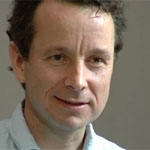Nobel Prize in 2003 for Structural and Mechanistic Studies of Ion Channels
-
Videos
- Video Interviews with Scientists
- Nobel Prize Video Interviews
- Issues of Concern
- Science Video Lectures
- Reflections on Science Videos
- Masterclass Science Videos
- Science Career Videos
- Lindau 2003 Documentary
- The Next Big Thing Science Videos
- Science Video Research Projects
- Educational Resources
- Documentaries
- Art & Science Videos
- STFC Video Portal
- Women in Science
- You are here >
- Home
- Programmes
- Nobel Prize Video Interviews
- Roderick MacKinnon - Science Video Interview
Roderick MacKinnon as a child liked the outdoors, hiking, fishing etc., he felt an affinity with the natural world but said he was excited by both physical and natural sciences. As a kid in Junior High School (11-12 years old) he was sent on a science enrichment course for a month where he was given a small microscope and loved it. He says he enjoys taking things apart to see how they work rather putting things together.
In this interview MacKinnon goes on to discuss Max Perutz and then his own research. He says his course into science was quite sequacious and he really didn`t start science until he was about 30 as he had a strong interest in athletics first. Initially, he went into Medicine but did not think it was science, as although it is important he found it more about pattern orientation than anything else. MacKinnon qualified in Medicine but realised at the age of 29 that he couldn`t do it. One thing that helped him get through medical school was studying mathematics which he still does (applied maths in general but not always). He left Medicine and went into science as he had a interest in Channels (electro-physiology protein ion channels) which he found fascinating. At Brandeis University in Chris Miller`s Laboratory he was asked to study potassium channels. The channel field at that time was separate from all the rest of bio-chemistry as people tended to be electrical engineering types and when MacKinnon was doing his post-doctoral studies he says we did not think about proteins but talked about resistence. Ion protein channel conductivity was very well known by the electrical signature but they were not known by their molecules in fact nobody had seen or crystallized one as it was very difficult. Even now the total number of membrane protein structures solved is less than 100. About a quarter of the genome is encoding membrane proteins. It is technically difficult as they are unstable and the membrane has to be removed in detergent and kept. He thinks that it is amazing the they have been crystallized at all but now entire viruses have been crystallized.
In 1995 he decided to leave a professorship at Harvard to dedicate his time to new structures of potassium channels. He moved to Rockefeller University where he started working with his wife Alice who is a chemist. As he knew that he had a lot to learn he decided that he needed to work alone and thought that the change of environment would focus his attention. He needed money to do the work and the Rockerfeller offered a start-up package under the director of Torsten Wiesel who invited him to visit.
MacKinnon`s message to students is don`t get caught up - just follow your interests and work hard and you`ll become an expert. He agreed that working off the main stream is where some of the most important work exists.
On world issues and social responsibility he says `yes` he does feel it but at present is delaying it as he feels too young and wants to solve another good problem. He wants to concentrate for a few more years on his science. He says that humanity is faced with huge difficulties with population growth and the management of our planet. We have done such a bad job he says and thinks that when he can contribute more (or perhaps help young scientists) he will make the transition. At present he would not do a good job he thinks as he is not a good multi-tasker. Management of our planet requires some great leadership he says.
There has been such a growth in information on science and scientists he thinks have done a poor job conveying this to the public. Many people are afraid of science and scientists have a bad image. People he thinks need to realise that science is beautiful - it is like looking a sunset or feeling the breeze. Science is a way of appreciating the world around us. Some people believe that science takes away and the destroys the mystery in life. MacKinnon says that the mystery grows as we get to know more science.
Links To Other Information:Nobel Lecture
Link to MacKinnon`s Nobel Lecture








